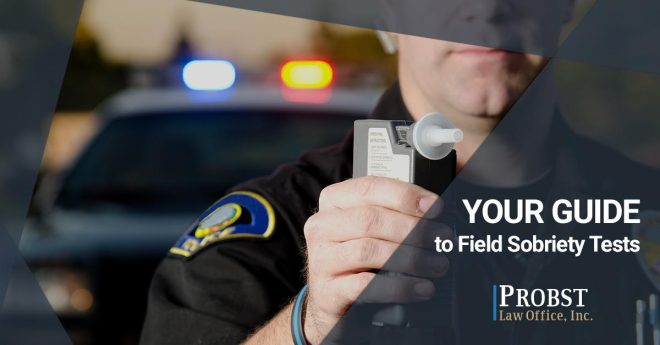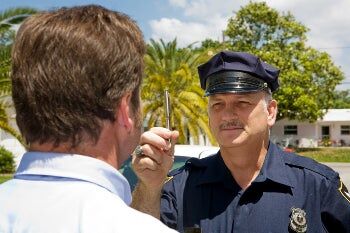
As New Jerseyans, we love our highways just as much as we love our diners and beaches. But let’s face it, nothing puts a damper on a night out quite like getting pulled over for a DWI. And as much as we may try to charm our way out of a field sobriety test, the reality is that these tests have their limitations when it comes to determining our level of intoxication. So buckle up, grab a cup of coffee (or maybe something a little stronger, no judgment here), and let’s dive into the wacky world of field sobriety testing in NJ DWI cases.
Common Field Sobriety Tests Used in NJ DWI Cases
So you found yourself in a sticky situation and now you’re being asked to perform some field sobriety tests. Don’t worry, we’ve got you covered with a rundown of the most common tests you might encounter in NJ DWI cases.
First up, we have the Horizontal Gaze Nystagmus (HGN) Test. This test involves following a moving object with your eyes while the officer looks for involuntary jerking movements. So, if you’ve ever had trouble focusing during a game of beer pong, you might want to start practicing your eye coordination.
Next, we have the Walk and Turn Test. This test requires you to take nine steps in a straight line, heel-to-toe, then pivot and take nine steps back. If you find yourself doing the cha cha slide instead, it might be time to call a cab.
The final test on our list is the One-Leg Stand Test. This test involves standing on one foot for 30 seconds while counting out loud. If you find yourself stumbling like a newborn deer, it might be a sign that it’s time to put down the keys and call for a ride home.
Inaccuracy and Subjectivity of Field Sobriety Testing
When it comes to field sobriety testing, there’s no denying that there is a lot of room for error. These tests, which are supposed to measure a person’s level of intoxication, often rely on subjective observations and judgments from the officer administering the test. This leads to a significant amount of inaccuracy in the results.
One of the most common field sobriety tests is the Walk and Turn test, where the suspect is asked to take a certain number of steps in a straight line heel-to-toe. However, even the most coordinated individual can struggle with this test if they’re nervous or wearing uncomfortable shoes. Plus, what if you have big feet? It’s not fair!
Another problematic test is the Horizontal Gaze Nystagmus, where the officer checks for involuntary jerking of the eyes as the suspect follows a moving object. But who’s to say that jerking eyes are always a sign of intoxication? Maybe they’re just tired from binge-watching Netflix all night.
Overall, field sobriety testing is riddled with inaccuracies and subjectivity. It’s time to reevaluate these tests and come up with more reliable ways to determine if someone is under the influence. Maybe a breathalyzer for your car keys? Just a thought.
Factors That Can Impact Field Sobriety Test Results
Ever wonder why some people can flawlessly walk in a straight line during a field sobriety test while others struggle to even stand still? There are several factors that can impact the results of these tests, making them not always as accurate as you might think.
First off, let’s talk about **nerves**. When you see those flashing lights in your rearview mirror and the officer asks you to step out of the car for a sobriety test, it’s normal to feel a little jittery. Your heart starts racing, your palms get sweaty, and suddenly walking heel-to-toe in a straight line seems like an impossible feat. So, next time you fail a field sobriety test, just blame it on those pesky nerves.
**Footwear** can also play a huge role in how well you perform on these tests. If you’re wearing stiletto heels or flip flops, good luck trying to walk a straight line or stand on one leg without wobbling. And don’t even get me started on those slippery dress shoes - they’re practically begging you to fail the test.
Another factor to consider is **balance**. Whether you’ve had one too many drinks or you just have terrible balance to begin with, it’s no surprise that some people struggle with field sobriety tests. Trying to balance on one foot while a police officer shines a blinding light in your eyes is a recipe for disaster, no matter how sober you may be.
Legal Challenges to Field Sobriety Test Evidence
Field sobriety tests have long been a staple in police officers’ toolkits for assessing a driver’s level of impairment. However, recent years have seen an increase in legal challenges to the validity of this evidence. Here are some common arguments made against the use of field sobriety test results in court:
- Lack of Standardization: Critics argue that field sobriety tests aren’t always administered in a uniform manner, leading to inconsistent results that can’t be relied upon in court. After all, dancing the Macarena isn’t exactly a standardized measure of sobriety.
- Physical Limitations: Many individuals have physical or medical conditions that could impact their performance on field sobriety tests. Being asked to walk in a straight line can be challenging enough for someone with two left feet, let alone someone with a balance disorder.
- Environmental Factors: The conditions under which field sobriety tests are conducted can also affect the results. Trying to balance on one leg during a hurricane-like windstorm might make even a sober person stumble.
Despite these challenges, field sobriety tests continue to be used as evidence in DUI cases. However, with the increasing awareness of the potential flaws in this type of evidence, the tide may be turning in favor of more reliable methods for assessing impairment behind the wheel.
Alternative Evidence Used in NJ DWI Cases
When it comes to NJ DWI cases, it’s not just the traditional evidence like breathalyzer results and field sobriety tests that can make or break a case. In fact, some alternative forms of evidence have been known to sway the verdict in unexpected ways. Here are a few examples of the unconventional evidence that may come into play:
- Witness testimonies from the local bar’s resident psychic
- Security camera footage of the defendant doing a flawless dance routine at a wedding just hours before getting pulled over
- Expert analysis of the defendant’s pizza order from earlier in the evening, suggesting a perfectly sober decision-making process
But wait, there’s more! In one particularly memorable case, a defense attorney successfully argued that the defendant’s unusually high level of charisma and charm could only be explained by their sobriety. It turns out, the defendant was just a natural smooth talker, not under the influence of alcohol.
So, the next time you find yourself in a bind with a DWI charge in New Jersey, remember that sometimes the most unconventional evidence can be the key to proving your innocence. Just make sure to have a good lawyer on your side to help navigate the wacky world of NJ DWI cases.
Importance of Consulting a DWI Defense Attorney
So, you made the not-so-wise decision to get behind the wheel after a few too many drinks. But hey, we’ve all been there, right? Well, maybe not all of us. But that’s beside the point. What’s important now is that you consult a DWI defense attorney to help you navigate this mess you’ve gotten yourself into.
Why should you bother with a lawyer, you ask? Well, for starters, these legal eagles know the ins and outs of the law like the back of their hand. They’ll be able to guide you through the complicated legal process and help you understand your rights and options. Trust us, you don’t want to be fumbling around in court like a deer in headlights.
Plus, a DWI conviction can have serious consequences, like hefty fines, a suspended license, and even jail time. Do you really want to risk facing these consequences without a skilled attorney by your side? We didn’t think so. So do yourself a favor and hire a DWI defense attorney ASAP.
Think of your attorney as your knight in shining armor (or maybe just a really sharp suit). They’ll fight tooth and nail to defend your rights and work tirelessly to get you the best possible outcome. With a lawyer on your team, you’ll have a much better shot at beating those DWI charges and putting this whole nightmare behind you.
Recommendations for Improving Field Sobriety Testing Accuracy
First and foremost, let’s ditch the old “walk a straight line” test. I mean, who walks a straight line when they’re sober, let alone after a few drinks? Let’s switch it up with something a bit more challenging and accurate, like a “dance-off” or a “balance beam competition”.
Next, let’s amp up the testing equipment. I’m talking high-tech gadgets and gizmos that can detect even the slightest hint of alcohol on someone’s breath. Forget the old-school breathalyzers, we need something straight out of a sci-fi movie. And while we’re at it, let’s add some cool sound effects and flashing lights for dramatic effect.
Another recommendation would be to incorporate some fun and interactive elements into the testing process. How about a mini obstacle course with cones and hurdles that the person has to navigate while wearing “drunk goggles” that simulate impaired vision? Or maybe a trivia game where they have to answer questions about alcohol content in different beverages?
And finally, we need to make sure that the officers administering the tests are well-trained and well-prepared. Maybe a mandatory “drunk driving simulator” training session where they have to navigate a virtual city while under the influence? Let’s make sure they’re on their A-game when it comes to detecting intoxicated individuals on the road.
FAQs
Why should I care about the limitations of field sobriety testing in NJ DWI cases?
Well, do you like the idea of being falsely accused of being drunk when you’re actually just a terrible dancer? Think about it!
Is it true that field sobriety tests are not always accurate?
Oh, absolutely! Just because you can’t walk in a straight line after a night of twerking on the dance floor doesn’t mean you’re drunk. It could just mean you’re a terrible dancer!
Can you give some examples of the limitations of field sobriety testing?
Of course! The tests may not take into account other factors that can affect your performance, like wearing high heels, or being nervous because you’re being watched by a cop. Plus, some people just have terrible balance because they never learned how to ride a bike properly!
How can these limitations impact someone’s DWI case in NJ?
Well, if you’ve been arrested for a DWI based on a field sobriety test, you could be facing some serious consequences even if you were just having a rough day and couldn’t walk in a straight line to save your life. It’s like being judged for your karaoke skills when you’re really only good at singing in the shower!
Are there any ways to challenge field sobriety test results in NJ DWI cases?
Yes, indeed! You can challenge the validity of the test by pointing out all the external factors that could have influenced your performance. Or you could just hire a lawyer who specializes in defending terrible dancers accused of DWI - I’m sure they exist!
Just Say No to the Sobriety Olympics!
So there you have it, folks. Field sobriety tests may be the go-to tool for law enforcement in NJ DWI cases, but as we’ve seen, they have their fair share of limitations. From being too subjective to being affected by various factors like age, weight, and footwear, these tests are about as reliable as your drunk friend trying to walk a straight line at 2 a.m.
So next time you find yourself in the unenviable position of having to perform a field sobriety test, just remember: it’s not the end-all-be-all. And maybe invest in some comfy shoes while you’re at it. Cheers to staying safe and sober (or at least avoiding the sobriety Olympics)!










